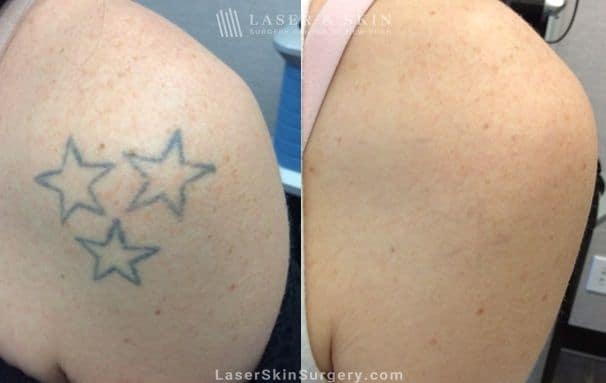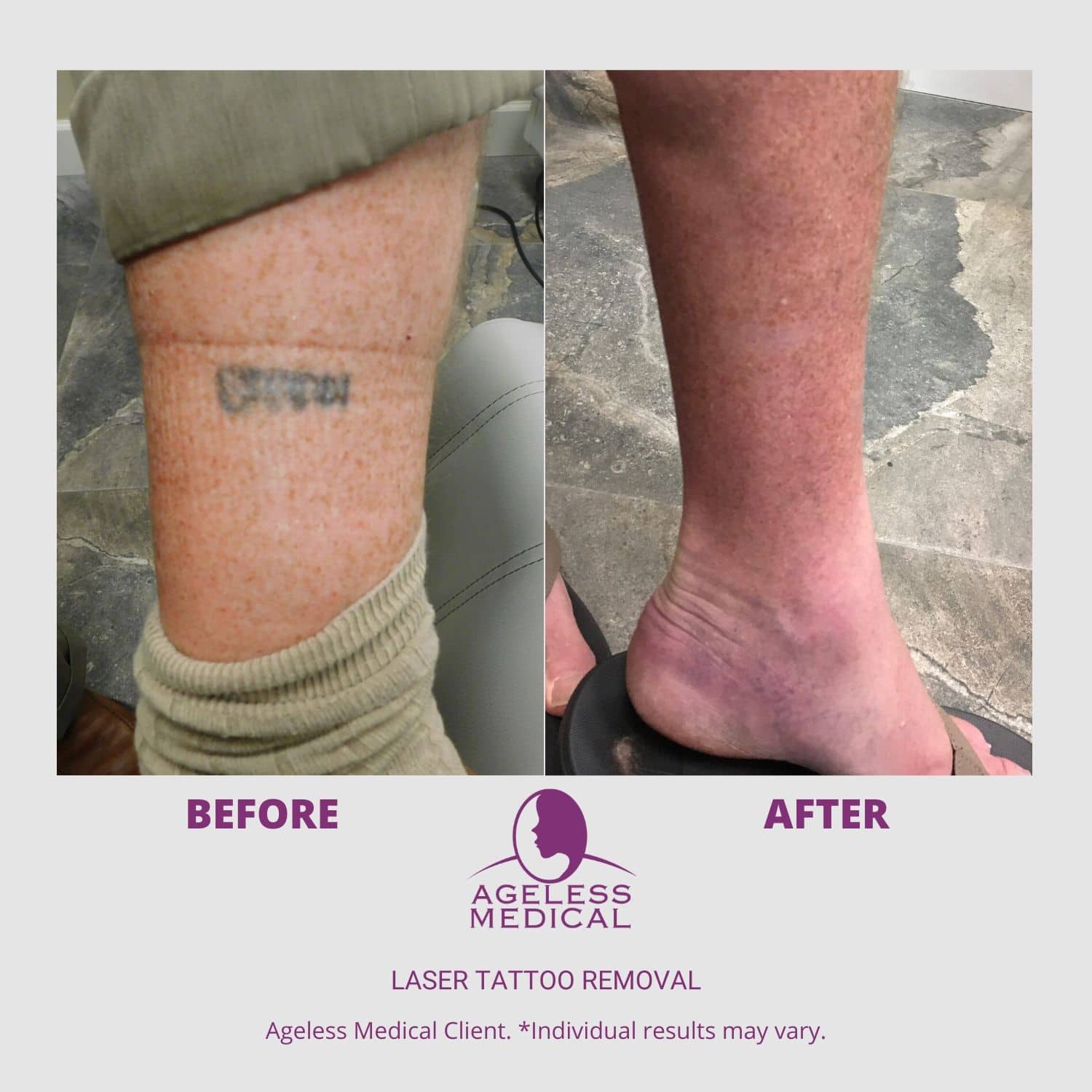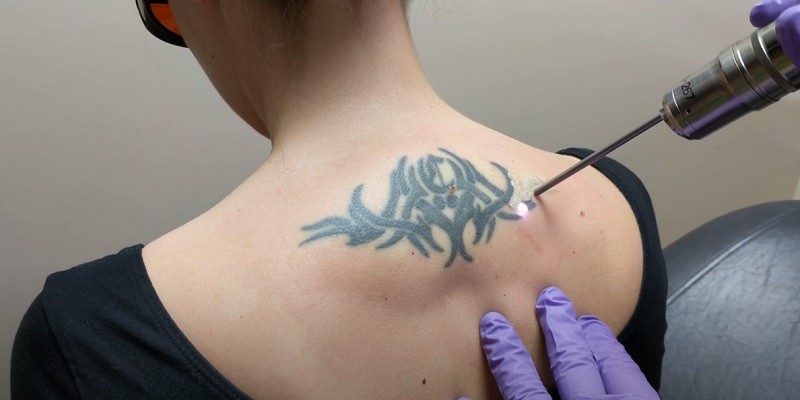Last Updated on June 18, 2025 by Jaclyn A. Neeley
Laser tattoo removal can sometimes leave scars, especially in individuals with darker skin tones, due to a loss of pigmentation. However, in most cases, there is little to no scarring from the process, and any scars that do occur may become less visible over time.
Introduction To Laser Tattoo Removal
Laser tattoo removal may cause scarring, especially in individuals with darker skin tones. However, over time, the scars may become less visible as pigmentation returns.
What Is Laser Tattoo Removal?
Laser tattoo removal is a procedure that uses laser technology to remove unwanted tattoos from the skin. It is considered to be one of the most effective and popular methods of tattoo removal.
How Does Laser Tattoo Removal Work?
Laser tattoo removal works by targeting the tattoo ink with a high-intensity laser beam. The laser breaks down the ink particles into tiny fragments, which are then gradually eliminated by the body’s natural processes.
During the procedure, a handheld device is used to deliver the laser energy to the tattooed area. The laser selectively targets the ink, leaving the surrounding skin unharmed.
Is Laser Tattoo Removal Effective?
Yes, laser tattoo removal is generally effective in removing tattoos. However, the effectiveness of the treatment can depend on various factors such as the size and color of the tattoo, the type of ink used, the depth of the ink, and the individual’s skin type.
In some cases, multiple sessions may be required to achieve the desired results. The number of sessions needed can vary from person to person.
It is important to note that complete tattoo removal may not always be possible, especially for tattoos with vibrant colors or deep ink. However, significant fading and lightening of the tattoo can usually be achieved.
Overall, laser tattoo removal is a safe and effective option for individuals looking to remove unwanted tattoos. It is important to consult with a qualified professional to determine the best treatment plan for your specific needs.

Credit: www.pinterest.com
Potential Risks And Side Effects
Laser tattoo removal may cause scarring, but it is not very common. Scarring is more likely to occur in individuals with darker skin tones or a loss of pigmentation. However, over time, the pigmentation usually returns and the scars become less visible.
Can Laser Tattoo Removal Cause Scarring?
When considering laser tattoo removal, one of the main concerns people have is whether it will leave behind any scars. While most individuals experience little to no scarring, it is important to note that scarring can occur in some cases, especially for those with darker skin tones. Scarring is usually the result of a loss of pigmentation during the tattoo removal process. However, over time, the pigmentation usually returns and the scarring becomes less visible.
What Are The Other Risks And Side Effects Of Laser Tattoo Removal?
In addition to the potential for scarring, there are other risks and side effects associated with laser tattoo removal. It is common for some temporary side effects to occur immediately after the treatment. These may include swelling and blistering of the treated area, as well as temporary changes in skin coloration.
Superficial scarring may also develop in some cases, which can result in long-term skin discoloration. However, it is important to note that these side effects and risks are rare and can generally be minimized with proper post-treatment care and precautions.
How To Minimize The Risk Of Scarring During Laser Tattoo Removal
To minimize the risk of scarring during laser tattoo removal, there are several steps you can take:
- Choose a reputable and experienced tattoo removal specialist who uses advanced laser technology.
- Follow all pre-treatment instructions provided by the specialist, such as avoiding sun exposure and moisturizing the skin.
- During the treatment, ensure that the laser settings are appropriate for your skin type and tattoo color.
- After the treatment, follow the specialist’s instructions for post-treatment care, including keeping the treated area clean and moisturized.
- Avoid picking at scabs or exposing the treated area to excessive sunlight.
- Attend all scheduled follow-up appointments to monitor the healing process and address any concerns.
By taking these precautions and following the guidance of a qualified professional, you can minimize the risk of scarring and other potential side effects during laser tattoo removal.
Factors That Influence Scarring
Laser tattoo removal can sometimes leave scars, particularly in individuals with darker skin tones. However, these scars often fade over time and become less visible as pigmentation returns.
Skin Type And Color
Your skin type and color can play a significant role in the scarring that may occur after laser tattoo removal. Individuals with darker skin tones are more prone to scarring compared to those with lighter skin tones. This is because the laser used in the removal process targets the pigment in the tattoo, which can also affect the surrounding skin pigment. However, it’s important to note that scarring in these cases is usually temporary and the skin’s pigmentation typically returns over time, making the scars less noticeable.
Tattoo Size And Location
The size and location of the tattoo can also impact the scarring that may occur during the removal process. Larger tattoos may require multiple sessions of laser treatment, increasing the risk of scarring. Additionally, tattoos located on areas with thinner skin, such as the wrists or ankles, may be more prone to scarring compared to tattoos on areas with thicker skin, like the upper arms or back.
Professionalism Of The Tattoo Removal Provider
The expertise and professionalism of the tattoo removal provider are crucial in minimizing the risk of scarring. It’s important to choose a certified and experienced professional who uses state-of-the-art laser equipment to ensure safe and effective tattoo removal. An experienced provider will have a better understanding of laser settings and techniques that minimize the risk of scarring while still effectively removing the tattoo.

Credit: www.laserskinsurgery.com
Methods To Minimize Scarring
When it comes to laser tattoo removal, one common concern for many individuals is the possibility of scarring. While most people find that there is little to no scarring from the process, it is important to take certain steps to minimize the risk of scarring. In this article, we will explore some effective methods to minimize scarring during laser tattoo removal.
Proper Aftercare Instructions
Proper aftercare is crucial in minimizing the risk of scarring after laser tattoo removal. Following the technician’s instructions carefully can help promote faster healing and reduce the chances of scarring. It is essential to keep the treated area clean and avoid excessive sweating or exposure to sun for a few weeks following the procedure. Applying a thin layer of antibiotic ointment and covering the area with a sterile bandage can also help protect the skin and minimize the risk of scarring.
Use Of Specialized Creams Or Ointments
Using specialized creams or ointments recommended by your laser tattoo removal technician can also aid in minimizing scarring. These creams or ointments contain ingredients that can soothe the skin, promote healing, and reduce the risk of scarring. Applying the cream as directed and massaging it gently into the skin can help improve the overall appearance of the treated area and prevent scar formation.
Combining Laser Tattoo Removal With Other Scar Reduction Techniques
Combining laser tattoo removal with other scar reduction techniques can be an effective way to minimize scarring. Some additional treatments that can be used in combination with laser tattoo removal include microdermabrasion, chemical peels, or the use of silicone gel sheets. These techniques can further enhance the healing process and minimize any potential scarring. It is important to consult with a dermatologist or a licensed technician to determine the best combination of treatments for your specific situation.

Credit: www.agelessmed.com
Frequently Asked Questions On Does Laser Tattoo Removal Leave Scars?
Do Laser Tattoo Removal Scars Go Away?
Laser tattoo removal scars can go away over time, but there is a possibility of scarring. Scarring is more common in individuals with darker skin tones and may occur due to a loss of pigmentation. However, the pigmentation usually returns and the scarring becomes less visible.
Does Laser Tattoo Removal Damage Skin?
Laser tattoo removal may cause temporary skin discoloration or superficial scarring, especially in individuals with darker skin tones. However, these scars usually fade over time and become less visible.
Can You Remove A Tattoo Without A Scar?
No, laser tattoo removal typically does not leave scars. However, in some cases, darker-skinned individuals may experience a loss of pigmentation, which can result in temporary scarring. Over time, the pigmentation usually returns and the scars become less visible.
Does Laser Tattoo Removal Fade Over Time?
Laser tattoo removal does not cause scarring, but it may initially result in temporary skin discoloration. Over time, the pigmentation typically returns and becomes less noticeable, allowing the tattoo to fade away.
Can Laser Tattoo Removal Leave Scars?
Laser tattoo removal can sometimes cause scarring, especially in those with darker skin tones. However, scarring tends to fade over time and become less visible.
Conclusion
While laser tattoo removal is generally considered safe and effective, there is a possibility of scarring, especially for those with darker skin tones. However, the loss of pigmentation and scarring tends to fade over time and become less noticeable. It is crucial to consult with a licensed professional and follow post-treatment care instructions to minimize any potential scarring.
Remember, each individual’s experience may vary, so it’s essential to have realistic expectations and discuss any concerns with your tattoo removal specialist.







